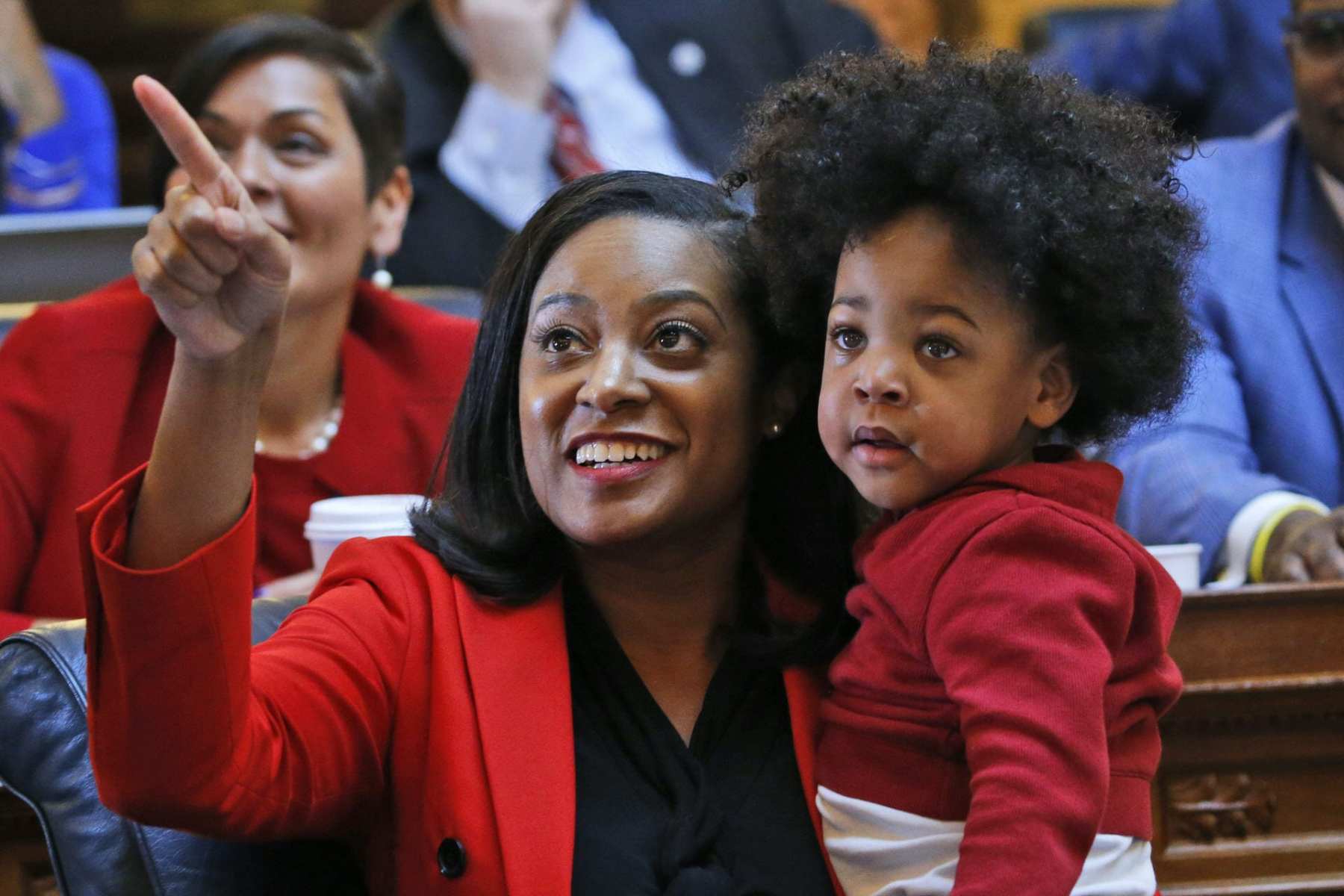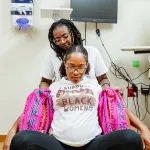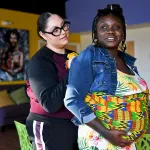Wendy Brawley’s pain kept worsening. She was 22, and it was her first pregnancy — doctors told her it was normal to be in pain, she said. But she knew something was wrong.
It took being in labor for 24 hours for a doctor to realize Brawley physically could never have had a regular delivery. An X-ray would have clearly shown that she had a pelvic obstruction. She ended up having an emergency cesarean section.
“I was scared half to death. I would never have been able to do it and I would have most likely died or the baby certainly would not have made it,” Brawley said. “People just don’t believe the level of pain we are experiencing.”
Thirty years later, Brawley is a Democratic representative in the South Carolina legislature. She co-sponsored a bill introduced this January that would require a committee to study pregnancy-related health outcomes. Down the road, she hopes it will create a requirement for doctors to receive implicit bias training, she said, in part to help Black women like her.
“These are real lives that are being lost, that can be saved if we did training and delivery of services differently,” Brawley said.
Black women are three times as likely to die from pregnancy-related causes than non-Hispanic White women because of racial and ethnic disparities, according to Centers for Disease Control and Prevention; Black, American Indian, and Alaska Native women in America are two to three times more likely to die from pregnancy-related causes than White women. These disparities remain true despite controlling for other factors such as income. (The CDC did not specifically account for nonbinary people in these data sets.)
“It comes from doctors simply not believing when Black women say that they are in distress, either because you know they’re having physical issues, or they may be even having some emotional issues that will impact their pregnancy and their postpartum,” Brawley said. “We can fix it with training and observation and acknowledging on the part of those healthcare providers that they do have this bias, and this is how we can correct it.”
For the Black women shaping pregnancy-related health policy in statehouses, the work is personal.
“We’re done dying. We’re done burying children,” said Erika Geiss, a Michigan state senator who is drafting legislation that will financially help support Black people through doula care, which offers support to birthing parents before and after birth. “We’re done being victimized and traumatized by a system that was built to do everything except have us as Black women, as Black mothers, thrive.”
Geiss, who has two children, approaches her work by talking directly to Black physicians and Black patients to see the types of changes they want implemented. This is part of the reason Geiss is working on legislation centered around financially supporting Black doulas through reimbursements. As a Black mother, Geiss said she feels as if she has a “mandate” to address the disparities facing other Black pregnant people across her state.
Clara Thomas, an assemblywoman in the Nevada legislature, said her adult daughter nearly died several years ago after she experienced serious complications from two of her pregnancies. Thomas said her daughter had clear symptoms with one pregnancy that were dismissed by doctors and led to a late diagnosis of preeclampsia. During another, she required emergency surgery to deliver at 27 weeks.
Thomas helped introduce legislation this year that would require an existing state maternal mortality board to collect more data on racial disparities in pregnancy-related and infant deaths. Lawmakers in the Assembly — which, like the Nevada Senate, has more women lawmakers than men — advanced the bill unanimously. She hopes more comprehensive information will prompt more related legislation.
“It’s not only my daughter,” the Democratic lawmaker said. “It’s so many other women who go through this, who lose their lives or their babies’ lives without knowing what happened, why it happened. And a lot of it has to do with doctors who are dismissive of Black women and women of color. We have to find out why, and this bill would give us the why.”
Jennifer Carroll Foy was pregnant with twins when she ran in 2017 to be a delegate in the Virginia legislature. Ahead of the primary, she was in a hospital room on bed rest to keep the babies healthy. She gave birth to her sons at 22 weeks.
Carroll Foy said she experienced intense, debilitating pain after the delivery but her nurses dismissed it. She remembers being sent home but later “dropping to my knees in excruciating pain.”
Carroll Foy’s husband took her back to the hospital, where she was diagnosed with a medical condition that she described as being nearly fatal had she stayed home.
“I just will never forget those feelings of not being listened to, not being seen, not being heard,” she said. She went on to work on expanding doula services under Medicaid.
Around the country, Black women in statehouses have been at the forefront of advocating for policies aimed at improving pregnancy-related health outcomes for Black people, but they’ve largely done the work behind the scenes, said Renee Smith, the state and policy manager for the Black Mamas Matter Alliance, a Black women-led organization that advocates for Black pregnancy-related health health.
“We’re no longer demanding a seat at the table,” Smith said. “Black women legislators on the state level are being resilient and proud to really press for measures in their state and local levels that will hopefully support Black birthing people.”
There has been growing momentum for federal policy to address Black pregnancy-related health disparities. U.S. Reps. Alma Adams of North Carolina and Lauren Underwood of Illinois lead the Black Maternal Health Caucus, which has helped advocate for the Black Maternal Health Momnibus Act of 2021, a package of 12 bills. More than 75 members of both the House of Representatives and Senate have co-sponsored the legislation.
Vice President Kamala Harris helped introduce an earlier version of the legislation when she was a U.S. senator and campaigned on the issue when she ran for president.
On Tuesday, the Biden administration announced their first-ever proclamation recognizing Black Maternal Health Week, which began Monday, in an effort to bring light to these disparities.
“I’ve heard stories from Black women who told their doctor they were experiencing pain, only to be sent away,” Harris said in a video. “Women from different backgrounds. Women with different education and income levels. And women who deserve to be heard and treated with dignity.”
It’s still unclear whether the full package of federal bills will advance. State legislators have the unique opportunity to enact legislation toward improving the disparities Black birthing people face, Smith said, recognizing that states have access to specific data that can help them more easily target the needs of their community without “taking on a big price tag.”
“States are just uniquely positioned to create greater access to maternity care,” Smith said. “States have a viewpoint of the different barriers, such as living in a city, living in a rural community, understanding the economic base of that area, understanding the access to education of those areas, understanding the access to health care facilities, and medical facilities for birthing people.”
Natalie Murdock, a state senator in North Carolina, is one of the primary sponsors of a state-level Momnibus bill. Murdock is not a parent, and she expressed reservations about pregnancy because of others’ experiences.
“I don’t have children yet but I’m definitely one of those Black women who’s already fearful of what that process will look like and what I will experience as a result of horror stories from my friends, of knowing that something wasn’t right but they felt as if they were ignored,” she said.
Black women state lawmakers are a driving force on pregnancy-related health policies in often predominantly White legislatures. It can be an uphill battle.
Brawley in South Carolina said she has faced resistance from White colleagues about implementing policies to address the dire realities of racial inequities: The bill to introduce a committee to study pregnancy-related health outcomes only passed 64-46 in the House chamber. Black women there are dying in labor at two and a half times the rate of their white counterparts, a staggering statistic Brawley wants her fellow legislators to look at more critically, she said.
“It is very difficult to get my colleagues to understand that Black women and Black people face different types of challenges in every arena,” she said. “My hope is that as a legislator, to be a champion for educating my colleagues.”
Geiss in Michigan said she was once asked by a White colleague why she needed to specify health outcomes for Black women and not just all women. Geiss works to educate others on how making policy for the most affected and vulnerable helps everyone, the Democratic lawmaker said.
“I think there’s this misconception that because the civil rights era was 50 years ago, that things were fixed,” Geiss said. “That people see me in positions of power, they see other Black people in positions of power and think that we’re done.”
Murdock, a Democrat, said a bill she introduced last year to expand doula services under Medicaid did not have enough support to advance in the Republican-controlled legislature. She doesn’t know whether there is enough support now to advance the Momnibus bill this session, but she noted that North Carolina ranks poorly compared to other states when it comes to Black pregnancy-related health. She hopes a comprehensive measure can advance.
“There were stories that I wasn’t even aware of from some of my own friends,” she said. “And I think the beauty of filing this type of legislation is you draw attention to issues that folks weren’t aware of. And you also encourage people to talk about it instead of suffering in silence.”
Carroll Foy in Virginia is now a candidate for the Democratic nomination for governor and has pregnancy-related health proposals as part of her campaign priorities. (She and state Sen. Jennifer McClellan are both running to become the first elected Black woman governor of any state.) Hala Ayala, a Virginia delegate who is seeking the Democratic nomination for lieutenant governor, has also released a plan to help Black people that includes a universal paid family and medical leave program. Carroll Foy said the lived experiences of Black women at the helm of state government can make a difference in what policy advances.
“It’s not like we are just predisposed or it’s inevitable that we have to die during childbirth or postpartum,” Carroll Foy said. “It’s not.”





